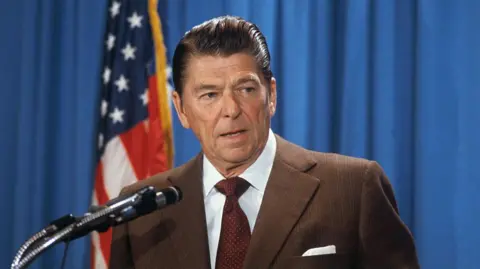 Getty Images
Getty ImagesUS President Donald Trump has said he will halt all trade negotiations with Canada immediately over an advert in which his predecessor Ronald Reagan says tariffs “hurt every American”.
The ad, sponsored by Canada’s province of Ontario and released last week, features excerpts of an address Reagan gave in 1987 focusing on foreign trade.
Trump called the advert “FAKE” while The Ronald Reagan Foundation said it “misrepresents” the former president’s address.
While the minute-long advert only includes excerpts from the original, five-minute-long address, it does not alter Reagan’s words. It does however alter the order in which he made the comments.
Below are the lines from the advert in italics, followed by an explanation of how they appear (indicated in bold) in the original address.
“When someone says, ‘let’s impose tariffs on foreign imports’, it looks like they’re doing the patriotic thing by protecting American products and jobs. And sometimes, for a short while it works, but only for a short time.”
This is the opening line of the minute-long advert. The words have not been altered.
But it is not until about halfway through his original address that Reagan speaks these lines.
The 1987 radio speech – Address to the Nation on Free and Fair Trade – begins with Reagan saying Japan’s prime minister will visit the White House and “recent disagreements” on trade will be discussed. Reagan had recently placed tariffs on some Japanese goods over a trade agreement dispute.
By the time he reaches the advert’s opening line, he has set out his aversion to tariffs, described the “prosperity and economic development that only free trade can bring”, and said high tariff legislation made the Great Depression even worse.
“Over the long run, such trade barriers hurt every American, worker and consumer.”
In the advert, these words immediately follow the first line. Again, Reagan did speak these words.
However, in the original address the two sentences are not connected. In fact they are separated by more than a minute of speech, and the “Over the long run..” line actually comes first.
After introducing the Japanese state visit, Reagan starts to explain why he recently introduced the tariffs.
He says in the original speech: “Imposing such tariffs or trade barriers and restrictions of any kind are steps that I am loath to take. And in a moment I’ll mention the sound economic reasons for this: that over the long run such trade barriers hurt every American worker and consumer.“
Reagan says some companies had been “engaging in unfair trade practices” and going against an agreement with the US – and that this was therefore a “special case”.
This sets the tone for the rest of the address, which he dedicates to making clear his commitment to free trade and the dangers of high tariffs.
“High tariffs inevitably lead to retaliation by foreign countries and the triggering of fierce trade wars.”
This is the advert’s third line, and again these are Reagan’s words. But again, in the original speech they do not follow straight on from the previous line in the advert. There is about one minute separating them in the address.
In the 1987 speech he says this line in the middle of his address while describing what he sees as the consequences of tariffs. He says:
“What eventually occurs is: First, homegrown industries start relying on government protection in the form of high tariffs. They stop competing and stop making the innovative management and technological changes they need to succeed in world markets. And then, while all this is going on, something even worse occurs. High tariffs inevitably lead to retaliation by foreign countries and the triggering of fierce trade wars.”
“Then the worst happens. Markets shrink and collapse, businesses and industries shut down and millions of people lose their jobs.”
Reagan does say this line after the previous one – but the advert cuts out a few sentences separating them.
Here is the full run from one to the next in the original:
“High tariffs inevitably lead to retaliation by foreign countries and the triggering of fierce trade wars. The result is more and more tariffs, higher and higher trade barriers, and less and less competition.
“So, soon, because of the prices made artificially high by tariffs that subsidize inefficiency and poor management, people stop buying. Then the worst happens: Markets shrink and collapse; businesses and industries shut down; and millions of people lose their jobs.”
“Throughout the world, there’s a growing realisation that the way to prosperity for all nations is rejecting protectionist legislation and promoting fair and free competition.”
Here, the advert jumps back about a minute – but the words are the same.
In the original, Reagan praises the economic benefits of free trade and continues: “Now, that message of free trade is one I conveyed to Canada’s leaders a few weeks ago, and it was warmly received there. Indeed, throughout the world there’s a growing realisation that the way to prosperity for all nations is rejecting protectionist legislation and promoting fair and free competition.”
He then talks about the “sound historical reasons” for this realisation: “For those of us who lived through the Great Depression, the memory of the suffering it caused is deep and searing.”
He says experts believe high tariff legislation passed at that time “greatly deepened the depression and prevented economic recovery”.
“America’s jobs and growth are at stake.”
This is how Reagan ends his speech both in the address and the advert, in relation to tariffs.
The final chunk of his speech is omitted from the ad – in which he says he is determined “to spare the American people the protectionist legislation that destroys prosperity” and criticises opponents in Congress who “want to go for the quick political advantage” and “forget” the millions of jobs involved in trade.










